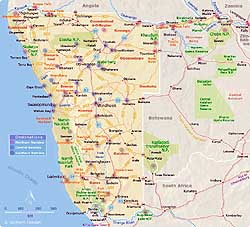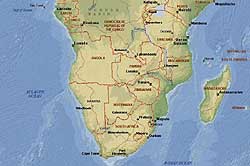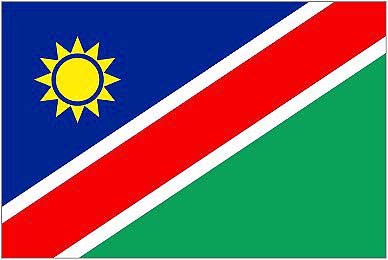-
- Namibia Map
|
-
- Southern Africa Map
-
|
|
-
|
- latest picture:
November 24, 2014
|
-
- November 2nd, 1992: On board of the vessel “Luisa” of the
MSC shipping line the film “Out of Africa” according to Karen Blixen’s
book runs on the screen. It brings tears to Liliana’s eyes. It
reflects exactly the mood we feel when in Cape Town we leave the
African continent that we have crossed from North (Tanger/Morocco) to South
(Capetown/South Africa) in four
years and 63'000 miles with destination Fremantle in Australia.
-
- July 1st, 2014: nearly 22 years later, coming from
Cape Verde, we land once more in
Africa – in Namibia, in the Southwest – for our second
Africa adventure.
|
-
-
-
-
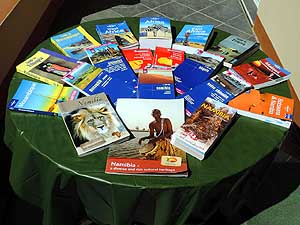 -
|
-
-
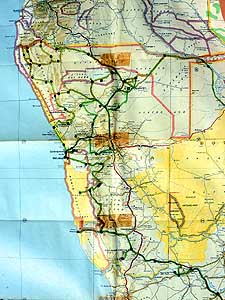
|
-
-
-
-
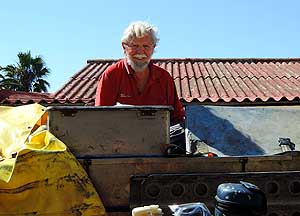
|
-
001
Indispensable for our second
- African adventure (despite GPS):
- Travel guide books and road maps
|
-
002
This was the route we travelled
- in Namibia in 1992. There is not much
- new land left in Namibia to discover for us
|
-
003
Emil is beaming! Coming from
- Mindelo on Cape Verde, our Land
- Cruiser arrived on July 17th, 2014,
- in Walvis Bay. At Loubser’s
- Backpacker he is storing our travel
- bags on the car’s roof rack
|
-
|
-
-
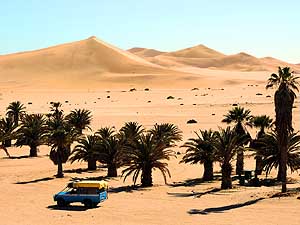
|
-
-
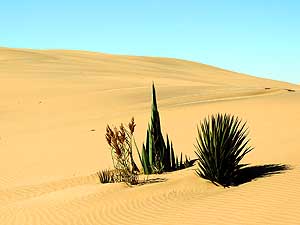
|
-
-
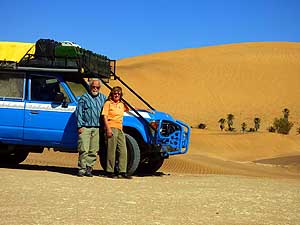
|
-
004
At dune No. 7, about 6 miles
- east of Walvis Bay, not much has
- changed since May 13th, 1992. It still
- conveys a real sense of desert …..
|
-
005
….. but surprisingly there is still
- some plant growth like this lovely trio
- despite the long dry periods …..
|
-
006
….. under a glorious blue sky
- we shoot a remembrance picture
|
-
|
-
-
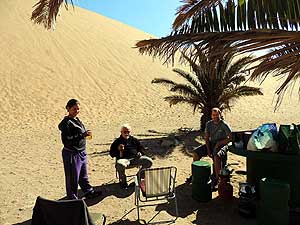
|
-
-
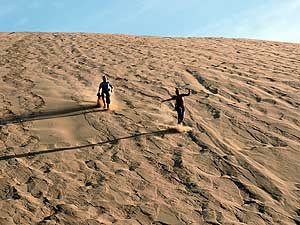
|
-
-
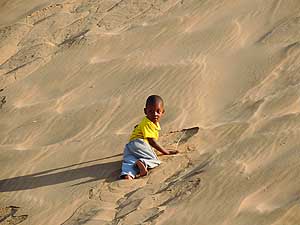
|
-
007
We enjoy a picnic together with
- Adilla and Stephan at Dune No. 7.
- They also shipped their LandCruiser
- to Namibia and intend to explore
- Africa north to Tanzania …..
|
-
008
….. down is easier than up!
- Both do not miss the chance to
- climb up the 430 ft. high dune …..
|
-
009
….. also this little guy wants
- to try. For him it is more sliding
- than climbing
|
-
|
-
-
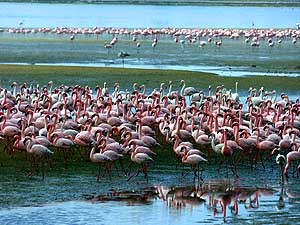
|
-
-
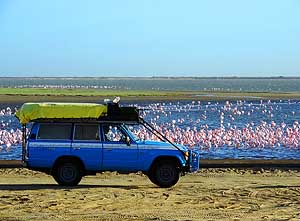
|
-
-
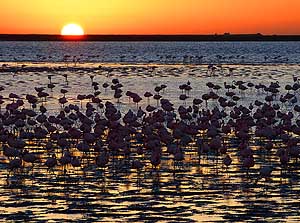
|
-
010
Flamingos – lesser and greater
- flamingos (Phoenicopterus minor und
- roseus) as far as the eye can reach.
- Along the Walvis Bay lagoon they roam
- densely packed in their thousends (up to
- 250’000) through the shallow water
|
-
011
The southern wind is freezing due to
- the Benguela current. We sit for hours in
- our LandCruiser and watch these beautiful
- birds. When they sleep they stand on one
- leg and put their beak under a wing
|
-
012
The sun disappears at the Walvis
- Bay lagoon. The flamingos are still
- searching for food. They filter the
- swirled up mud through their beaks
|
-
|
-
-
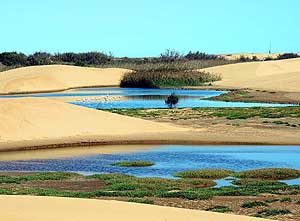
|
-
-
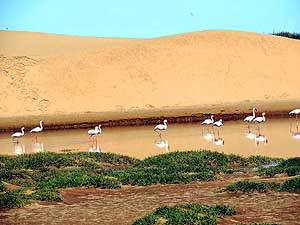
|
-
-
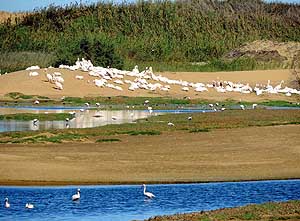
|
-
013
East of Walvis Bay, the deep
- blue secluded pools between the
- dunes are a true paradise and
- sanctuary for birds …..
|
-
014
….. also a few flamingos, some from
- those 250’000 living around the Walvis Bay
- Lagoon – a “Ramsar Natural Heritage Site”
- – went “astray” here …..
|
-
015
….. also white pelicans
- (pelecanus onocrotalus) populate
- one of the small dunes between the quiet
- pools that sometimes nearly drie out
|
-
|
-
-
-
-
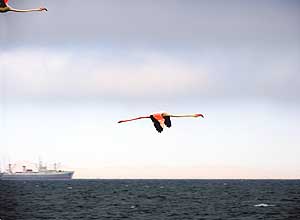 -
|
-
-
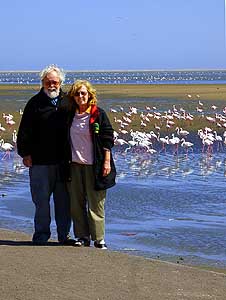
|
-
-
-
-
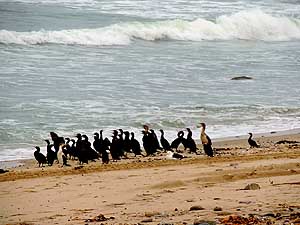
|
-
016
A flamingo high in the air impresses
- us by its remarkable wingspan
|
-
017
Can a backdrop be more beautiful
- for a remembrance picture? With this
- photo we say good bye to the flamingos
- at the Wavis Bay Lagoon
|
-
018
Along the Namibian Coast,
- influenced by the cold Benguela Current
- from Antarticta, not only flamingos
- gather, but also Cape Cormorans
- (Phalacrocorax capensis)
|
-
|
-
-
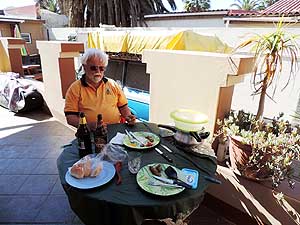
|
-
-
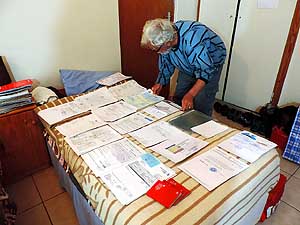
|
-
-
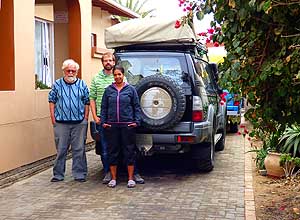
|
-
019
It tastes nice! Lunch on our
- terrace at
Loubser’s B&B
- in Walvis Bay
|
-
020
Emil is arranging the evidences for
- the
Guinnesss Book of Records that we
- have to submit for our yearly update
|
-
021
Our neighbors Adilla and Stephan
- with their LandCruiser at Loubser’s B&B
- yard in Walvis Bay. We spent a lovely time
- with them, enjoying many delicious éclairs!
|
-
|
-
-
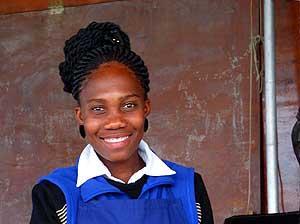
|
-
-
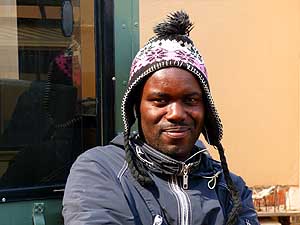
|
-
-
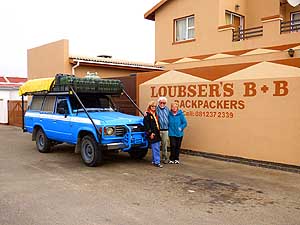
|
-
022
At the “Oceans Restaurant” at
- the Walvis Bay waterfront there is not
- only delicious food, but also an exotic
- waitress with a lovely hairstyle
|
-
023
Always a smile on his face! A servant
- at Loubser’s B&B in Walvis Bay
|
-
024
Good-bye picture with Lala, the
- lady owner of Loubser’s B&B in Walvis
- Bay where we spent 57 relaxed days
- while firstly waiting for the arrival of our
- Toyota and afterwards exhausting all
- possibilities to get an Angola visa
|
-
|
-
-
-
-
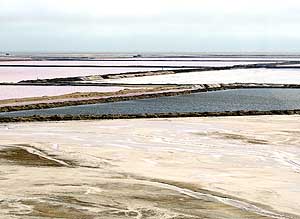 -
|
-
-
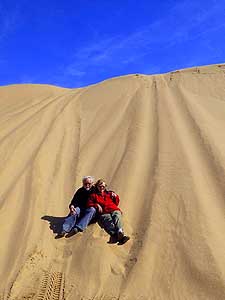
|
-
-
-
-

|
-
025
Salt flats on the way to the
- “Pelican Point”. The “Walvis Bay Salt
- Works” want to boost soon their annual
- output of 650’000 tons by about 50%
|
-
026
It feels good in the dunes! Here on
- our way to the “Pelican Point” Peninsula
|
-
027
Sea gulls crow to the strong sea
- breeze at “Pelican Point”. Its “Donkey
- Bay” is also a surfing spot for inter-
- national surfer who are waiting for the
- “big wave” arriving from the Southwest
|
-
|
-
-
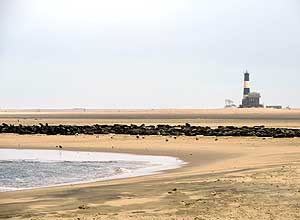
|
-
-
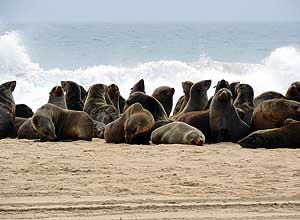
|
-
-
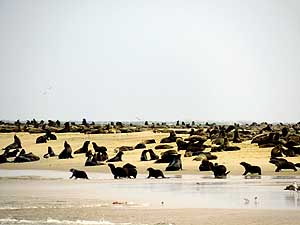
|
-
028
At “Pelican Point”, about 6 miles
- beeline – 16 miles of track west of
- Walvis Bay, close to the luxury hotel
- near the lighthouse huge colonies of the
- “Brown Fur Seals” (Arctocephalus
- pusillus) are breeding …..
|
-
029
….. the males are around 7.5ft in
- length and weigh from 400-660lb. Females
- are smaller, averaging 5.9ft in length and
- weighing an average of 260 lb …..
|
-
030
….. whether they waddle on
- land or dive into the sea, these colossus
- are always entertaining to watch
|
-
|
-
-
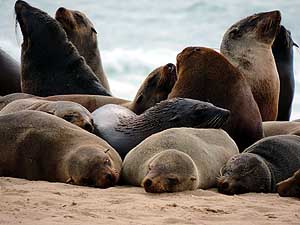
|
-
-
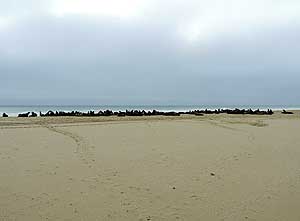
|
-
-
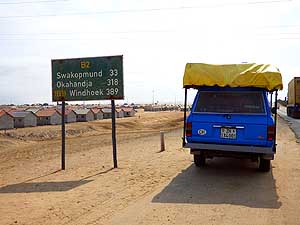
|
-
031
“Don’t dare to disturb us”! End
- of November/Beginning of December it
- is getting busier. Females give birth to their
- pups. They remain in and around the
- colony for the next ten to eleven months
|
-
032
A black ribbon of Cape fur seals
- stretches along a big part of the coast of
- “Pelican Point”. 23 huge seal colonies
- breed at the Namibia and South African
- Coast with tens of thousands of animals,
- despite of the commercial cullings
|
-
033
On the right of the road sign to
- Swakopmund and Windhoek is our
- rolling “home”. On the left side uniform
- low cost houses – former “townships”
- – are stretching along the highway;
- here Kuisebmund with about half of
- the people of Walvis Bay
|
-
|
-
-
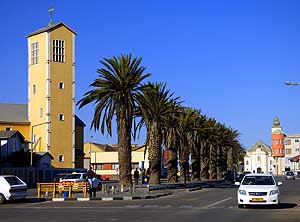
|
-
-
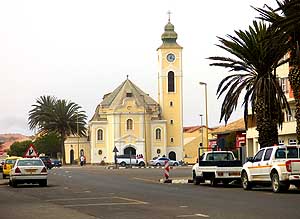
|
-
-
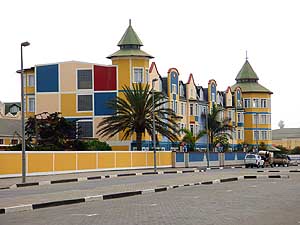
|
- Swakopmund – Namibia’s premier holiday resort – is a treasure
chest on German, well preserved,
- restored and even new constructed colonial buildings, what adds to
the city’s charm
|
-
034
Palm lined “Daniel Tjongarero
- Ave.” (former Poststrasse) with the tower
- of the Catholic Church of Swakopmund
|
-
035
(German) Evangelical
- Lutheran church, consecrated 1912
|
-
036
New business building,
- built in the old German colonial style
|
-
|
-
-
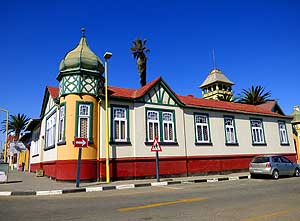
|
-
-
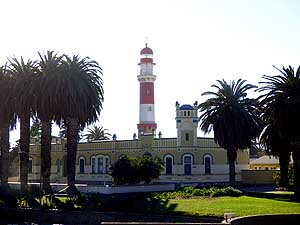
|
-
-
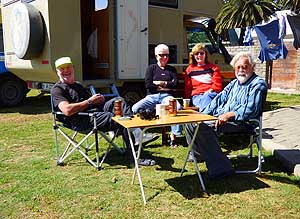
|
-
037
Beautifully restored building with
- the tower of the “Woermann House”
- in the background, built in 1905
|
-
038
Lighthouse, completed in 1902 –
- 21 years older than the one at “Pelican
- Point” in Walvis Bay (picture # 28)
|
-
039
Reunion after 18 years with Anne
- and Wilfried at the “Alte Brücke”
- Campground in Swakopmund. We
- met them for the first time begin of
- April 1989 in Tamanrasset/Algeria
|
-
|
-
-
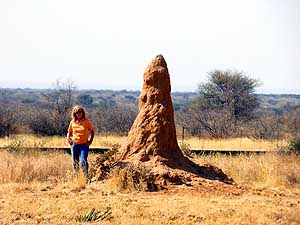
|
-
-
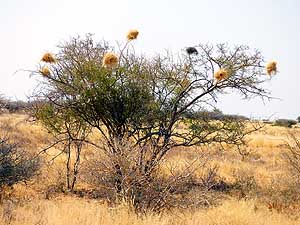
|
-
-
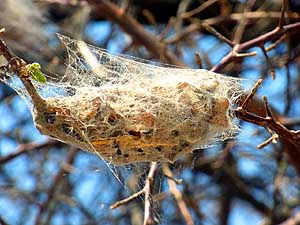
|
-
040
Liliana poses next to a termite
- mound, which are characteristic of the
- African savannah. The adamant walls
- are difficult to break up. Predators are
- anteater and armadillos. Whereas the
- former cannot be found in Africa, the
- pangolins only exist in Namibia’s south
|
-
041
Thorny acacia, adorned with
- bird nests, belong to the African
- savannah just as the termite mounds
|
-
042
Probably a nest of the rain
- spider or huntsman spider
- (genus Palystes), one of the biggest
- spiders in Southern Africa
|
-
|
-
-
-
-
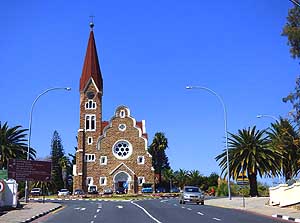 -
|
-
-
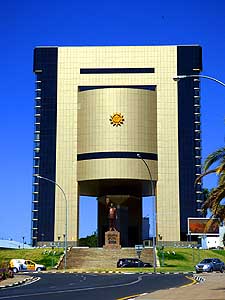
|
-
-
-
-
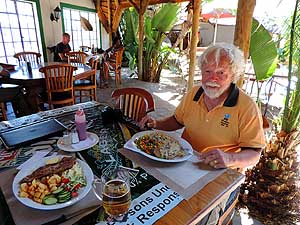
|
-
043
The Christ Church at the Robert
- Mugabe Avenue in Windhoek is a
- historic landmark, proclaimed as a
- National Monument. It was built
- 1910 in what was then German
- South-West Africa
|
-
044
The new, on March 20th, 2014,
- inaugurated „Independence Memorial
- Museum“ in Windhoek looks like a
- “coffee grinder” and was planned
- and built by North Koreans
|
-
045
At the Garden Restaurant
- “Wirtshaus Windhoek” along
- Independence Avenue we enjoy the
- good German cuisine. We celebrate
- the receipt of our Angolan visa
|
-
|
-
-
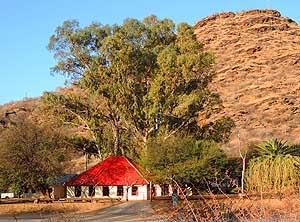
|
-
-
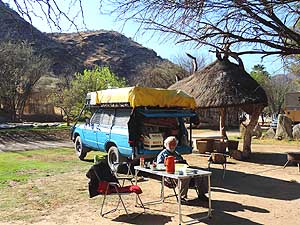
|
-
-
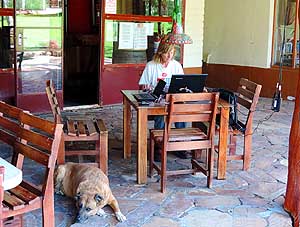
|
-
046
The “Elisenheim Guest Farm”,
- about 9 miles north of the capital
- (3.3 miles east of the main highway
- B1 to Okahandja). The huge Australian
- eucalyptus (Eucalyptus) rising
- 132 ft. towards the sky grows
- through the restaurant roof
|
-
047
Our camping site at the “Elisenheim
- Guest Farm” where we enjoy the
- quietness and the birdlife …..
|
-
048
….. our “regulars' table” with
- the wireless internet on the patio of the
- restaurant where Liliana is busy writing
- the Angolan captions for our
website
|
-
|
-
-
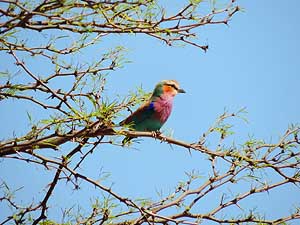
|
-
-
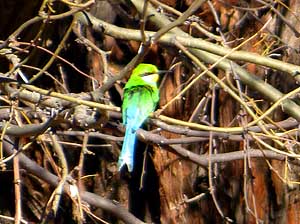
|
-
-
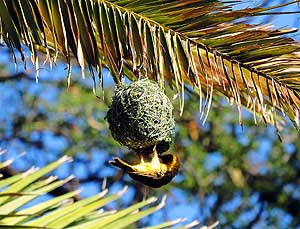
|
- We enjoy the twittering of all the birds visiting us daily at the
“Elisenheim Camping”:
|
-
049
A Lilac-breasted roller
- (Coracias caudatus)
|
-
050
A Swallow-tailed bee-eater
- (Merops hirundineus)
|
-
051
A southern masked weaver
- (Ploceus velatus) building its nest:
- It builds it at the edge of a palm leaf,
- where snakes and other predators
- cannot reach it. Time: About 1 day
|
-
|
-
-
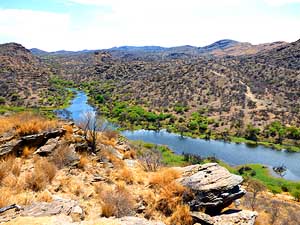
|
-
-
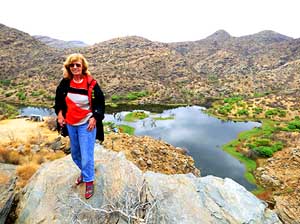
|
-
-
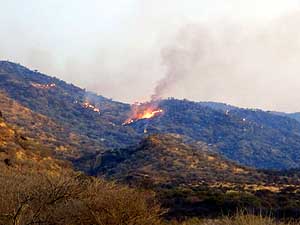
|
-
052
The blue ribbon is a result of the
- dammed-up river on the property of the
- “Elisenheim Guest Farm”. It’s possible
- to camp there “off the beaten track” .....
|
-
053
….. Liliana overlooking the peaceful
- mini reservoir, where at its shore camping
- is also possible …..
|
-
054
….. a bush fire is blazing in the
- region spreading incredibly fast due to the
- extreme dryness. Obviously it was arson
|
-
|
-
-
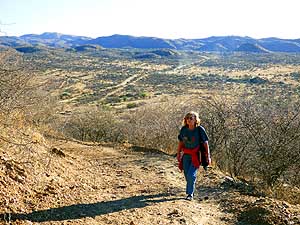
|
-
-

|
-
-
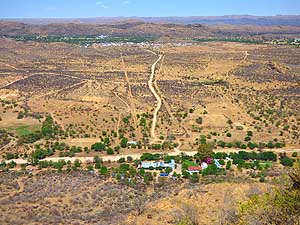
|
-
055
Liliana is walking to the antenna
- at the “Elisenheim Guest Farm” –
- 660 ft. higher up …..
|
-
056
….. view from the antenna
- to our camping spot …..
|
-
057
..... and far to the plains where the
- new residential area (city) “Elisenheim”
- with around 5’000 houses is under
- construction (currently only about 200)
|
-
|
-
-
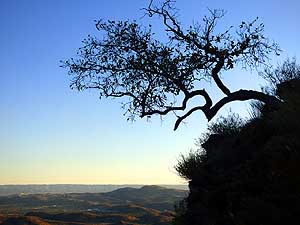
|
-
-
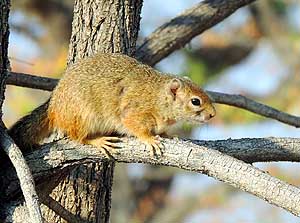
|
-
-
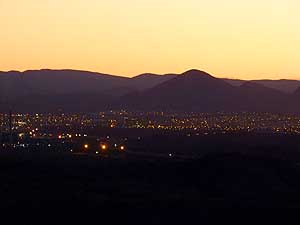
|
-
058
A tree, bent by timeless winds,
- overlooking the plains towards the
- north of Namibia
|
-
059
A squirrel in Africa? Apparently
- they are native also to Namibia: Smith's
- bush squirrel (Paraxerus cepapi)
|
-
060
The lights of the capital Windhoek
- (here the North) sparkle in the plain.
- Windhoek lies in a basin on an altitude
- of about 5’600 ft. and counts about
- 350’000 people
|
-
|
-
-
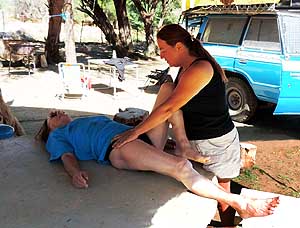
|
-
-
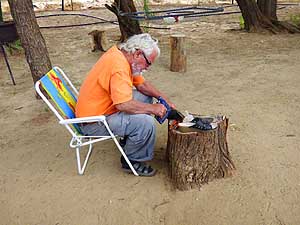
|
-
-
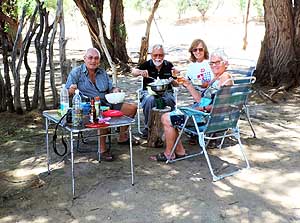
|
-
061
Ursula, a co-camper and chiro-
- practor from Germany, adjusts Liliana’s
- "Sacroiliac Joint" on our camping table,
- which dislocated because of an abrupt
- move during chilly temperature. A painful
- and tedious convalescence with
- medication followed
|
-
062
Emil, the “handy man”,
- repairs Liliana’s shoes
|
-
063
Happy faces and celebration
- at the occasion of a re-encounter after
- 25 years: In the African bush, the
- Swiss Fondue offered by Dorly
- and Wolfgang with their Iveco
tastes even better!
|
-
|
-
-
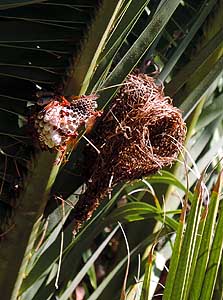 -
|
-
-
-
-
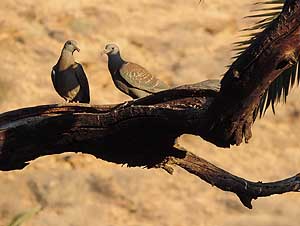
|
-
-
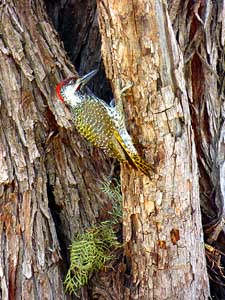
|
-
064
Side by side at the same palm
- leaf: A bird's nest and a wasp nest
|
-
065
A peaceful picture of togetherness:
- The rock pigeon (Columba guinea)
- is a resident of the African savannah
|
-
066
A golden-tailed woodpecker
- (Campethera abingoni) is busy
- knocking on a knobby tree
|
-
|
-
-
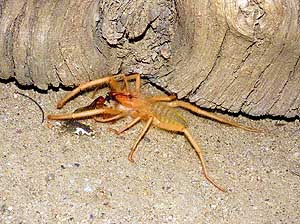
|
-
-
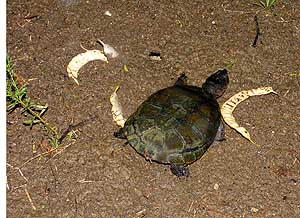
|
-
-
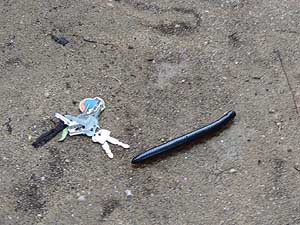
|
- Creepy crawlies that appear on our campsite:
|
-
067
A tarantula respectively camel
- spider (Solifugae) feeding on a moth
|
-
068
A turtle creeping
- past our LandCruiser
|
-
069
A millipede on the run
|
-
|
-
-
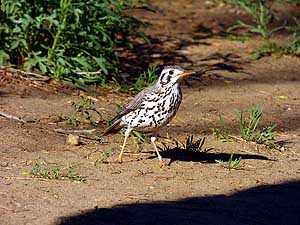
|
-
-
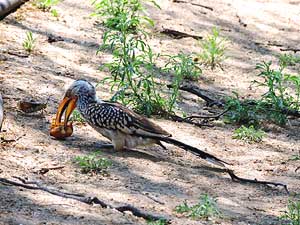
|
-
-
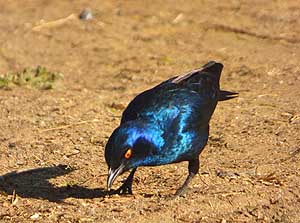
|
- They are never far away:
|
-
070
The groundscraper thrush
- (Psophocichla litsitsirupa) dashing
- round with its fairly long legs
|
-
071
The Southern Yellowbilled
- Hornbill (Tockus leucomelas) that
- regularly interrupts Emil’s siesta when
- it wants something to pick
|
-
072
The blue feathers of the Cape
- Glossy Starling (Lamprotornis nitens)
- are glistening beautifully in the sunshine
|
-
|
-
-
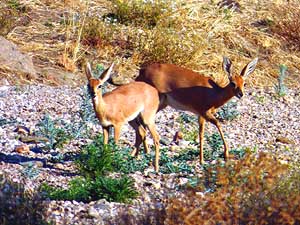
|
-
-
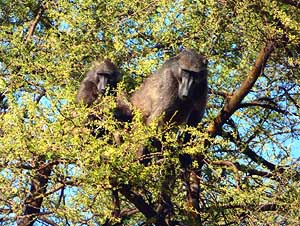
|
-
-
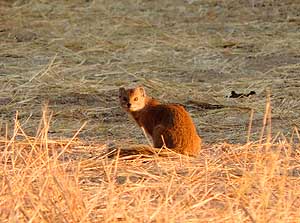
|
-
073
Two shy dik-diks (Madoqua
- kirkii) scan attentively their surroundings.
- At the shoulder they are only about
- 12 to 15 inches tall
|
-
074
Two treacherous baboons (chacma
- baboons - Papio ursinus). They are
waiting
- for an opportunity to snatch some food
- from campers and leave behind a mess
|
-
075
“Watch out, an intruder is
- approaching!” An ever watchful yellow
- mongoose, also called “red meerkat”
- (Cynictis penicillata). It eats lizards,
- insects and scorpions
|
-
|
-
-
-
-
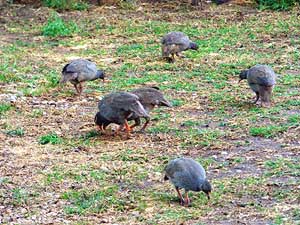
|
-
-
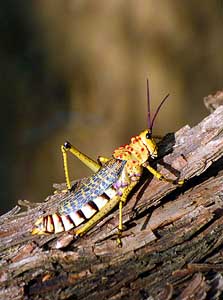
|
-
-
-
-
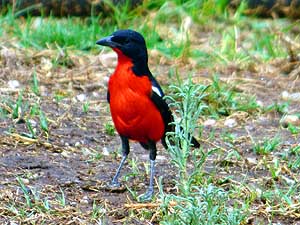
|
-
076
Swainson's spurfowl (Pternistis
- swainsonii) are searching for seeds and
- bread crumbs. They cackle so loud that
- one could get a hearing damage
|
-
077
Even a locust (Phymateus baccatus)
- can be impressive
|
-
078
The Crimson-breasted shrike
- (Laniarius atrococcineus) makes itself
- felt through its short whistle. It eats
- worms and lays its eggs preferably
- into another birds nest
|
-
|
-
-
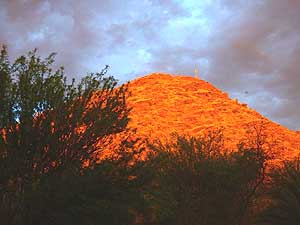
|
-
-
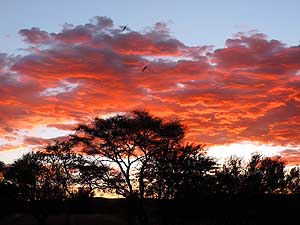
|
-
-
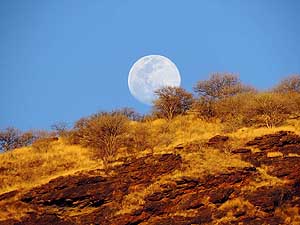
|
- African moods near the “Elisenheim Guest Farm” that delight us
over and over again:
|
-
079
The evening light makes
- the hill to glow
|
-
080
The setting sun bewitches us
- with its play of crimson clouds
|
-
081
The moon is rising behind
- the golden gleaming savannah
|
-
|
- Continuation to the next Namibia page: Namibia Part 2
–
from Windhoek to the Angolan border and back again
|
-
- The "Greater"-Middle East trip 2012/13
+ Cape Verde 2013/14:
- Sharjah/Dubai/1st Traveler's Festival/Emirates
National Auto Museum - UAE with
car Nov. 2012 to Jan. 2013 - part 1
- Western UAE - Liwa - United Arab Emirates with car in January 2013 - part 2
- Oman 2013 – Part 1 - February
2013: Musandam Peninsula
- Oman 2013 – Part 2 - February
2013: Sohar - Muscat - Rustaq - Nizwa
- Oman 2013 – Part 3 - March
2013: Sur - East Coast - Island of Masirah - Dhofar
- Oman 2013 – Part 4 - March
2013: Salalah & Surroundings (Dhofar) - Nizwa
- Oman 2013 – Part 5 - March 2013: Western Hajar
Mountains
- Al Ain, Eastcoast & Ras al Khaima - United
Arab Emirates with our car in April 2013 -
part 3
- Iran - part 1: Ferry Port Bandar Abbas-Shiraz-Persepolis-Pasargad (between Persepolis and Yazd)
– May 2013
- Iran - part 2: Pasargad
(excl.)-Yazd-Esfahan – May 2013
- Iran - part 3: Esfahan
(excl.)-Chelgerd-Hamadan-Sanandaj-Orumiyeh – May 2013
- Turkey - Iran
Border-Esendere-Hakkari-Van-Dogubayazit-Kars-Ardahan-Hopa-Georgia Border – May 28 to June 4, 2013
- Georgia - part 1: Ajaria-Gori-Tbilisi-Kakheti-Azerbaijan Border – June 4
to 13, 2013
- Azerbaijan - Georgia
Border-Balakan-Seki-Lahiç-Baku-Xinaliq-Quba-Laza-Baku-Ganca-Georgia Border – June 13 to 24, 2013
- The African trip 2013-15:
- CapeVerde: Santiago/Praia part 1
– November18th to December 13th, 2013
- CapeVerde: Fogo –
Dezember13th to 23rd, 2013
- CapeVerde: Brava – December
23rd to 26th, 2013
- Cape Verde: Santiago/Praia part 2
– December 26th, 2013 to February 28th, 2014
- Cape Verde: São Nicolau – February 28th to March
13th, 2014
- Cape Verde: São Vicente/Mindelo part 1
– March 13th to 20th, 2014
- Cape
Verde: Santo Antão/Eastern side part 1 –
March 20th to April 7th, 2014
- Cape
Verde: Santo Antão/Western side part 2 –
April 7th to 10th, 2014
- Cape
Verde: São Vicente/Mindelo part 2 –
April 10th to 29th, 2014
- Angola Part 1 –
September 26th to October 4th, 2014
- Angola Part 2 –
October 4th to 22nd, 2014
- Namibia Part 2 –
from Windhoek to the Angolan border, back again and on to
South Africa
|
-
|
![]()
